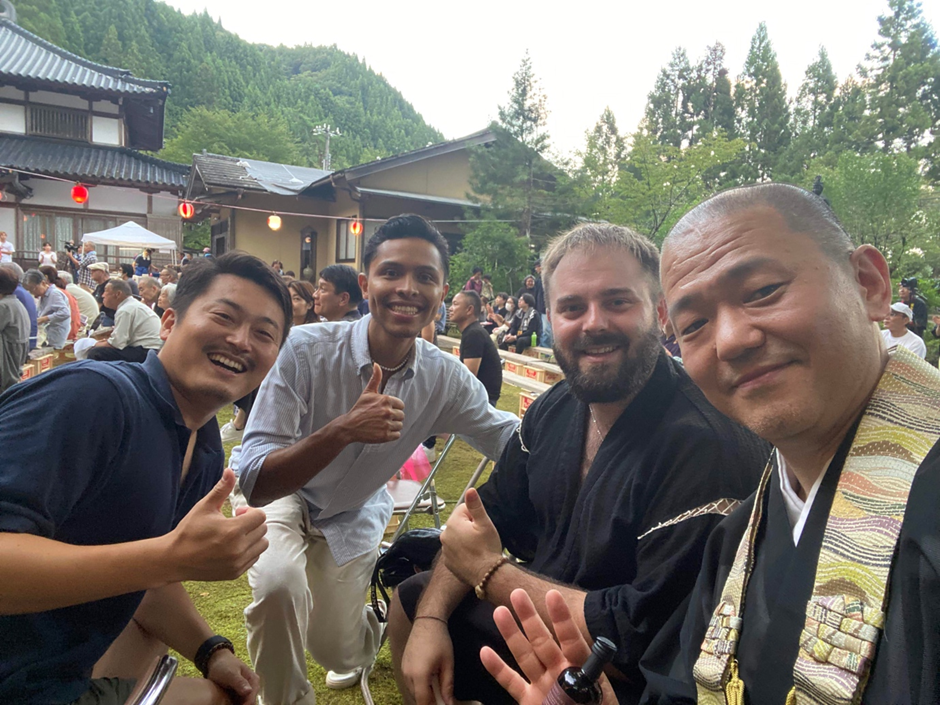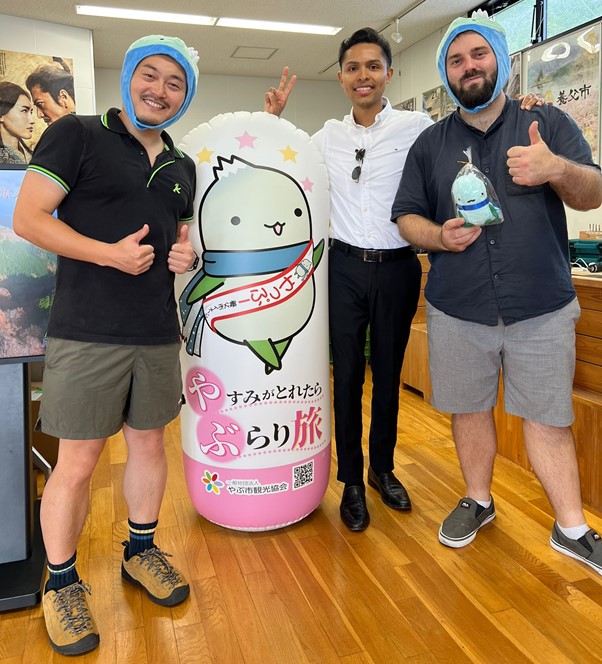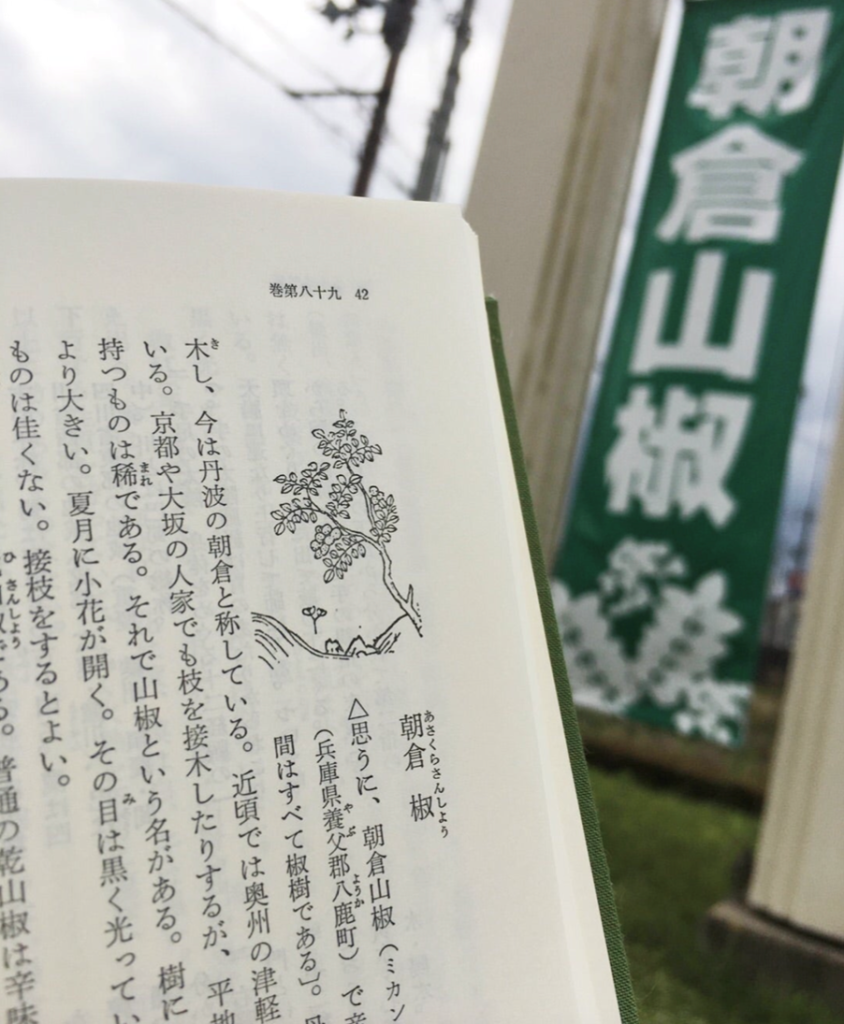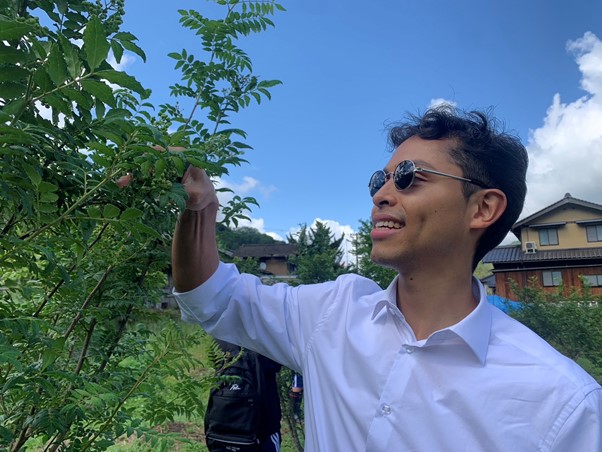by Josko Kozic
For me, a PhD student of religious studies studying contemporary practiced Buddhism and sacred cultural heritage, the Tajima region including the town of Yabu in Hyōgo Prefecture is an important place for fieldwork. In addition, it is also my partner’s hometown, so every visit to his family is an opportunity to conduct additional field research and open up new adventures, encounters and perspectives. Today I would like to give you an example of how this charming town is being promoted through the efforts of local and international actors and highlight the important role of a Buddhist temple in creating community and creative exchange in the region.

Copyright © Josko Kozic 2023
In August 2023, I was kindly invited to an O-bon dance festival by the head Priest of Yabu’s Buddhist temple Nikkō-in. Priest Morita is a passionate music-lover who frequently invites musicians and orchestras from all over the world to Yabu for public music events. When I met him first in 2021, he kindly introduced me to his temple and an ancient statue of a rather rare and special Buddhist deity known by the name of Uhō bosatsu (“Rain blessing Boddhisatva”). This time, Priest Morita invited the famous singer Kawachiya Kikusuimaru, who sings so-called Kawachi Ondo folk songs, primarily incorporating topics such as street life, the working class, yakuza, rough language and Buraku communities as their main theme. The concert took place inside the outdoor part of Nikko-in temple and was held for several hours, beginning in late afternoon and lasting until early night. It was accompanied by Taiko drum and guitar players and got to its climax when all guests started to do an O-bon dance to the music, relaxing and enjoying themselves in the heat of the summer night, occasionally quenching their thirst with some freshly cut watermelon. The concert allowed the locals to gather and spent some carefree time in the wanton mood of a music concert held in a rather unusual location and also provided the opportunity for some exchange between me and Priest Morita.

Copyright © Shota Tadano 2023
But the event was also an opportunity to get to know a new friend I had made just before the concert: Cesar Romero, who works in the Trade and Tourism Department as the International Relations Coordinator for Yabu City. I met Cesar by chance at Yabu City Hall, right next to Yōka City Station (michi no eki), where I went to buy a small doll of the local mascot (yurukyara), called “Yappu”, and to get some fresh Sanshō pepper, which is famous nationwide for its luscious fragrance and can trace its reputation back to the Edo period. Cesar approached me and since then we kept in touch and decided to attend the concert at Nikko-in Temple together. Afterwards, he invited us to a newly opened izakaya in Yabu, which is run by young locals and uses regional ingredients for both traditional and fusion food and drinks. Cesar is of Canadian-Colombian descent but grew up in Japan, where he is now involved in numerous activities in Yabu and beyond. During our first conversation, I was very impressed to hear about his experiences working on projects such as harvesting yuzu and Sanshō pepper or organizing a lavish sake event at Yabu’s Akenobe mine.

Copyright © Josko Kozic 2023
Primarily, Cesar’s activities are aimed at making Yabu more open to inbound tourism by producing tourism material in English and advising the city on how to improve signage for international tourists. In addition, one of his tasks is to represent Yabu at international tourism conventions, where he encourages travel agencies from all over the world to promote tourism in Yabu. This also involves highlighting alternatives to mass tourism along the Golden Road and focusing on “slow tourism”. In addition, Cesar approaches local groups or members of the Regional Development Cooperation Corps (chiiki okoshi kyōryokutai) to develop possible activities for tourism. Another of Cesar’s tasks is to promote the internationalization of the city in order to make Yabu more foreigner-friendly and to inform residents about intercultural skills and the importance of multiculturalism. According to Cesar, the Yabu region lacks vitality and curiosity to try new things. He adds that the aging community is inevitably becoming more conservative and as a result, part of the community is seriously considering efforts to attract foreign tourists. Although Yabu has many assets that can be promoted abroad, such as Tajima beef, Yōka pork, Asakura Sanshō pepper and local sake, Cesar criticizes the lack of focus of Yabu’s outdated tourism model, which is heavily dependent on the weather, with winter being the busiest season. With warm winters like in 2023, many businesses would not be able to make a profit.

Copyright © Cesar Romero 2023
Reflecting on how much Priest Morita as a local and Cesar as a non-local, each separately or hand in hand, can influence social life and tourism in Yabu and surrounding areas, made me realize how social interaction within and beyond cultural and linguistic boundaries acts as an essential tool for rural revitalization engagement and efforts. Many thanks to Cesar Romero and Priest Morita for giving me such deep insights into a region that I consider my “second home!”
Josko Kozic is a PhD candidate at the Institute for Religious Studies at Heidelberg University and currently a visiting scholar at DIJ Tokyo, Nanzan Institute and Sophia University. His current project focuses on the interconnectedness of religious practices, their socio-economics and their politics in relation to cultural heritage efforts (including UNESCO). He specializes in the study of contemporary Shugendō practice, esoteric Buddhism and the iconography of Hindu-Buddhist heritage sites in South, Central and Southeast Asia.
